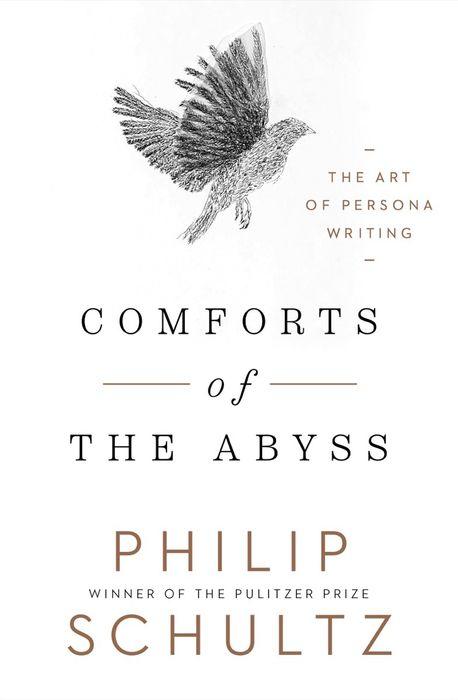
Philip Schultz won the Pulitzer Prize for Poetry with a book called Failure. Comforts of the Abyss presents Schultz’s method of persona writing. I would call it memoir but apparently that’s an out-mode term. Here’s Schultz writing about the books that most affected him as a kid:
“…I’d go around pretending I was Jack Barnes In The Sun Also Rises and Holden Caulfield in The Catcher in the Rye, and even old Huck Finn in Adventurers of Huckleberry Finn. Their opinions and attitudes became mine and I would even try to talk and act the way I imagined they did. Which wasn’t an easy feat for a dyslexic.” (p. 1)
Schultz struggled in school because of his undiagnosed dyslexia. He thought he was dumb. Finally Schultz was diagnosed with dyslexia. He didn’t learn to read until he was 11…but he made up for lost time fast.
Much of Comforts of the Abyss chronicles Schultz’s interactions with famous writers: Philip Roth, Norman Mailer, Elizabeth Bishop, Joan Didon, etc. Those sections are buffered by the poems and poets that affected Schultz’s career as a teacher at Kalamazoo College. Schultz’s favorite contemporary poet is Elizabeth Bishop so he devotes multiple sections of this book to analyzing her work.
If you’d like to see how a poet lives his life, both ups and downs, what famous people he meets, what books and poems most affect him, Comforts of the Abyss reveals much of what made Philip Schultz a good poet. Do you read much poetry? GRADE: B
Table of Contents:
The Mind’s First Freedom 1
The Shitbird, Named and Unnamed 6
I Never Wanted to Be Me, I Don’t Think 13
Pity and Fear 23
My Two Libraries 32
The Poet and the Fiction Writer; Conduits of Revelation 48
Our Most Curious Artifact 62
Somebody Loves Us All 75
Penurious Arrogance 86
A Magic Act 98
Indian Wrestling 107
Which Side Are You On? 119
Voices Veiled and Unveiled 132
The Socratic Method 144
In the Nature of a Test 151
The Map of the World 160
Gussie 168
I Came, I Saw, I Suffered 176
In the Manner of Poetry 184
A New City of Words 193
Anger and Shame 202
The Argument and the Lullaby 211
What We Want 220
Acknowledgments 223
Credits 227
I’ve not read poetry since college. It just doesn’t interest me very much.
Steve, I read a lot of poetry when I was going to College, but less and less year after year.
Not to any great degree nowadays. My favorite poet is Wallace Stevens. I used to spend hours lost in trying to get to the bottom of what his poems were saying. Great stuff!
Deb, Wallace Stevens is in my TOP 5 POETS. Yeats is my Number One.
The notion that this isn’t a literary memoir in the purist sense is seemingly foolish, but poets will seek to create neowords as readily as anyone who isn’t a bureaucrat. I imagine that the effort spent in reading a novel with dyslexia made the assumption of various personas that much more likely for him…if probably annoying at dinner.
I like poetry, and still infrequently write some, but I do tend to prefer prose, for avocational reading. I will turn to the short stories and possibly the essays in a little magazine, or to the articles and stories in a generalist intellectual magazine such as HARPER’S, ahead of the poetry.
William Sfafford, Langston Hughes, Dorothy Parker, even less surprisingly I suspect Borges, are among my lifelong favorites…Ciard, Plath, so many others have work which sticks in the memory. Hell, Kipling, as well as “Lewis Carroll”
William Stafford, of course, rather than his vaguely Czech cousin.
Todd, I have a number of John Ciardi’s books of poetry that I need to find and read.
My typing is recently even more atrocious than usual. Swiss Ciard, indeed. Should probably be checked out (or Ciecked).
Todd, I’m tormented daily by the insidious WORDPRESS spellchecker who changes my correct words to incorrect words without telling me.
At various periods I have read poetry. I like narrative poetry–close to a short story in other words. I am not very clever at pulling meaning from metaphors.
Patti, from time to time I’ll go back and reread Shakespeare’s Sonnets. Marvelous!
I was struck by:
The books that most affected him as a kid: I’d go around pretending I was Jack Barnes In The Sun Also Rises and Holden Caulfield in The Catcher in the Rye, and even old Huck Finn in Adventurers of Huckleberry Finn. Their opinions and attitudes became mine and I would even try to talk and act the way I imagined they did. Which wasn’t an easy feat for a dyslexic.” (p. 1)
Well it wasn’t easy for a 15-year-old kid either, but that’s what happened to me when I read Chandler, Hemingway, Perelman, McMurtry, Ian Fleming, and a motley mix of others back in High School. It got so bad (and, I suspect, irritating!) my friends and classmates began hinting that if I wanted to move out to the Mean Streets of LA, visit Spain or even join MI5 they wouldn’t stand in my way.
Dan, these were the books I got from the America-House while still at school – every two weeks they brought new “modern” US books, translated into German of course. And later Cannery Row, Walk on the wild side etc.
But it took me more than 20 years to get to visit the USA …
Do I read much poetry? No, none.
What is “persona writing” anyway?
I think I’ll pass on this one.
Jeff, we’ve become a nation of narcissists so obsession with one’s persona (especially on Social Media) is a hot topic today.
The only poetry I’ve read in the past 50 years has been on shithouse walls!
Bob, I imagine that could be a large number!
Some are in my own home!